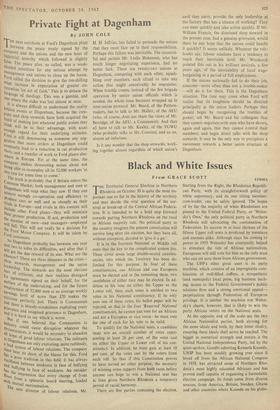Private Fight at Dagenham
By JOHN COLE
THE neat antithesis at Ford's Dagenham plant between the peace treaty signed by the Company and the unions and the new bout of industrial anarchy which followed is slightly false- The peace plan, so called, was a weak- minded substitute for any serious attempt by Management and unions to clean up the house. '01-(1 called the decision to give the ten-shilling wage increase in expectation of greater co- operation 'an act of faith.' This is to debase the language of theology. This was a gamble, and one where the stake was lost almost at once. It is always difficult to understand the reality behind events at Dagenham, because the com- pany and shop stewards have both acquired the habit of making just whatever public noises they think will be to their advantage, with scant e,nough regard for their underlying attitudes. Ford is still denouncing as nonsense any sug- gestion that more strikes at Dagenham could eventually lead to a reduction in car production there, and a transfer of work to Ford plants else- where in Europe. Yet at the same time, the c°4-1. PanY makes threatening noises about not being able to re-employ all its 32,000 workers 'at any rate for some time to come.' The truth is probably that if Britain enters the Cutnnflon Market, both management and men at r., aLgennam will reap what they sow. If they can achieve enough co-operation and efficiency to Produce cars as well and as cheaply as their rivals to Europe—and rivals in this context will their present production. If not, production and the number of men—and managers—employed ll fail- This will not really be a decision for the Ford Motor Company. It will be taken by Ford customers. So Dagenham probably has between one year and two to solve its difficulties, and after that it Will get the due reward of its sins. What are the Chances? There are three elements in the crisis— ,811013 stewards, management and the union 1-eaciershiP. The stewards are the most obvious .1Glitt of criticism, and their reckless disregard rar agreements signed on their behalf, for the employmentearnings of 32,000 men at an average weekly earnings level of more than £20 makes the criticism perfectly just. There is Communism a2.d there is bloody-mindedness exploiting every
and and imagined grievance at Dagenham,
nte id it is hard to say which is worse.
But if one believed that Communists in ind
ttstrY could cause disruption whatever the airionmstances, it would be necessary to abandOn at ,,,h°13e of good labour relations. The militants a Luagenharn are only exploiting, quite ruthlessly, 'ad system of labour relations. The company has bear its share of the blame for this. Ford a.s a Poor tradition in this field. It has always avrictiii Hated between weakness in face of bullying has the in face of weakness. An outsider Waos the impression that every change of front froma splenetic board meeting, loaded oh Mutual recrimination. Ti. e new director of labour relations, Mr. H.H. Jeffries, has failed to persuade the unions that they must face up to their responsibilities. Perhaps this failure was inevitable. The resource- ful and patient Mr. Leslie Blakeman, who has much longer negotiating experience, had no better luck. There are twenty-two unions at Dagenham, competing with each other, squab- bling over members, each afraid to take any action that might conceivably be unpopular. When trouble comes, instead of the fire brigade operation by senior union officials which is needed, the whole issue becomes wrapped up in inter-union protocol. Mr. Beard, of the Pattern- makers, has to talk to Mr. Hallett, of the AEU (who, of course, does not share the views of Mr. Berridge, of the AEU, a Communist). And they all have to talk to Mr. Kealey, of the TGWU (who probably talks to Mr. Cousins), and so on, almost ad infinitum.
Is it any wonder that the shop stewards, work- ing together almost regardless of which union's
card they carry, provide the only leadership at the factory that has a chance of working? They can meet quickly and take action quickly. If Mr. William Francis, the dismissed shop steward in the present case, had a genuine grievance, would there be any hope that the unions could handle it quickly? It seems unlikely. Whatever the rule- books say, labour relations have a tendency to reach their inevitable level. Mr. Woodcock pointed this out in his brilliant analysis, a few years ago, of the inevitability of local wage- bargaining in a period of full employment.
If the unions nationally fail to do their job, someone—more often than not a trouble-maker —will do it for them. This is the Dagenham situation. The time may come when Ford will realise that its toughness should be directed principally at the union leaders. Perhaps they should begin by recognising the realities of power; tell Mr. Beard and his colleagues that they cannot negotiate with men who have shown, again and again, that they cannot control their members; and begin direct talks with the shop stewards. It may be the only way to precipitate a movement towards a better union structure at Dagenham.














































 Previous page
Previous page